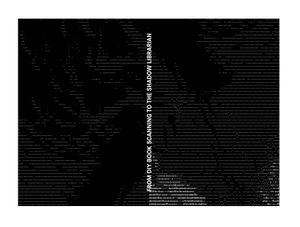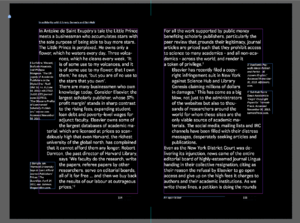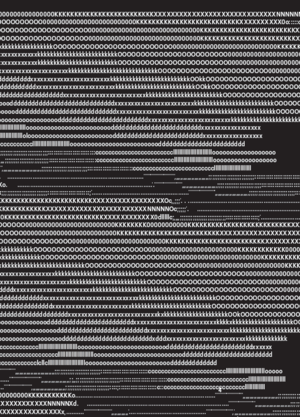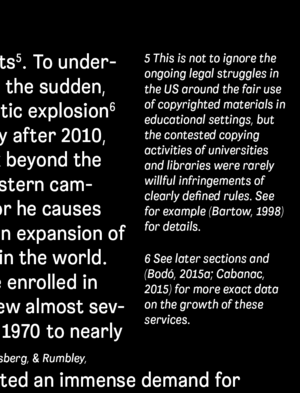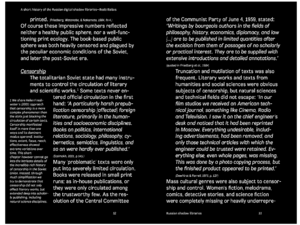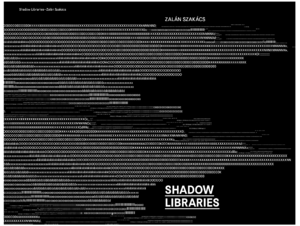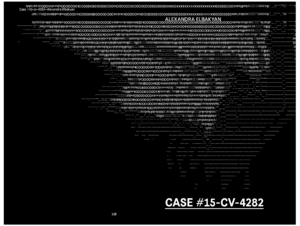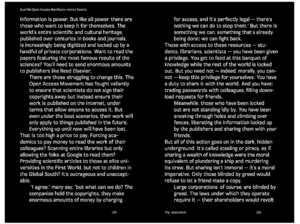ReaderZalan
From DIY Book Scanning to the Shadow Librarian
Reflections on Book Scanning: A Feminist Reader
Key questions
- What is feminism?
- What are feminist methodologies?
- How to use feminist methodologies as tool to unravel the known / unknown history of book scanning?
- How to could have shadow libraries have relationship to feminism?
The last question became my research subject, while focussing on the case of Alexandra Elbakyan, the founder of Sci-Hub and tracing back the origins of the shadow libraries starting from the Soviet era of Russia. During the reader research process I became familiar with feminist methodologies while understanding the implementing gender balance / neutrality in the reader.
My research
- What are shadow libraries?
- What is the origin of them?
- How are pirate libraries influencing our comtemporary academic publishing?
- Who are the main activist (not anonymous) in this field?
- What is the importance of the language in the reader?
- How to could have shadow libraries have relationship to feminism?
Final list of works included
QUICK WORKFLOW FOR SCANNING— Tomislav Medak, Dubravka Sekulic, An Mertens
A SHORT HISTORY OF THE RUSSIAN DIGITAL SHADOW LIBRARIES— Bodó Balázs
KUTATÓK GERILLA FORRADALMA ZAJLIK A SZABADON HOZZÁFÉRHETŐ TUDÁSÉRT— Bence Horváth
PIRATES IN THE LIBRARY— Bodó Balázs
GUERILLA OPEN ACCESS MANIFESTO— Aaron Swartz
CASE #15-CV-4282— Alexandra Elbakyan
DIE ROBIN HOOD DER WISSENSCHAFT— Anna Schughart
IN SOLIDARITY WITH LIBRARY GENESIS AND SCI-HUB— Dušan Barok, Josephine Berry, Bodó Balázs, Sean Dockray, Kenneth Goldsmith, Anthony Iles, Lawrence Liang, Sebastian Lütgert, Pauline van Mourik Broekman, Marcell Mars, spideralex, Tomislav Medak, Dubravka Sekulic, Femke Snelting
To see my zotero library click here
Design process
- representing the preciousness of knowledge → working in a small scale (95 mm x 145 mm)
- reference to the Printing out the internet project by Kenneth Goldsmith → black / white colours
- dynamic layout to make the readable of the texts more exciting
- ASCII art was partly generated from the signification experiments → reference to the internet
- Brezel Grotesk as typeface by Stefanie Preis (Designer) & Milieu Grotesque (Type Foundry) → spicing up the heavy subject
Production process
- the reader was printed and bound with Betty – Expresso Book Machine in the American Book center Amsterdam
Inside of the reader
Abstract
From DIY Book Scanning to the Shadow Librarian, traces back the beginnings of the shadow libraries starting from the Soviet era of Russia and explores its impact on comtemporary academic publishing. Amongst other things, the text selection Informs the reader about activists in this field such as Aaron Swartz, the writer of Guerilla Open Access Manifesto and Alexandra Elbakyan, the founder of Sci-Hub.
Excerpt from the introduction
In 2015 I heard the first time about shadow libraries during my research project about the future of libraries, called “Behind the Bookshelves”. I became so intrigued about this topic, that I decided to interview one of the main leading researchers about pirate libraries, Bodó Balázs from Institute of Information Law, University of Amsterdam and include the interview in the research book.
With this reader I will try to unfold the complexity of this fascinating topic to the public by highlighting several elements of this constant mechanism of knowledge, library, open access, piracy, scholary publishing, guerrilla open access and Sci-hub. Starting with several scientific writings such as A SHORT HISTORY OF THE RUSSIAN DIGITAL SHADOW LIBRARIES— Bodó Balázs, where the describes the roots of the Russian shadow libraries. Through the reconstruction of the micro-histories of peer produced online text collections that played a central role in the history of RuNet, we are able to link the formal and informal support for these sites to the specific conditions developed under the Soviet and post Soviet times.
Moving on the second scientific article PIRATES IN THE LIBRARY—An inquiry into the guerilla open access movement by Bodó Balázs. The goal of this article is to contribute to the discussions of the future of scholarly communications through the description of a phenomenon which poses the single greatest challenge to the scholarly publishing status quo in recent history.
This book makes the reader familiar with this topic from different aspects by facing two leading figures of the guerrilla open access Aaron Swartz from GUERILLA OPEN ACCESS MANIFESTO and Alexandra Elbakyan from Sci-Hub. Highlighs as well their ideas and thoughts about scholary publishing and guerrilla open access. Nevertheless this reader could works as instructional manual for scanning workflow by taking more a practical approach in the article QUICK WORKFLOW FOR SCANNING— by Tomislav Medak, Dubravka Sekulic, An Mertens.
The last chapter IN SOLIDARITY WITH LIBRARY GENESIS AND SCI-HUB by Dušan Barok, Josephine Berry, Bodó Balázs, Sean Dockray, Kenneth Goldsmith, Anthony Iles, Lawrence Liang, Sebastian Lütgert, Pauline van Mourik Broekman, Marcell Mars, spideralex, Tomislav Medak, Dubravka Sekulic and Femke Snelting. It serves as an open letter and motivation statement for sharing knowledge freely and don’t let our knowledge crushed!

